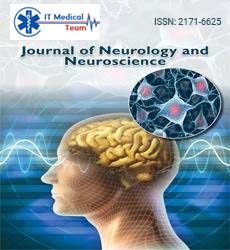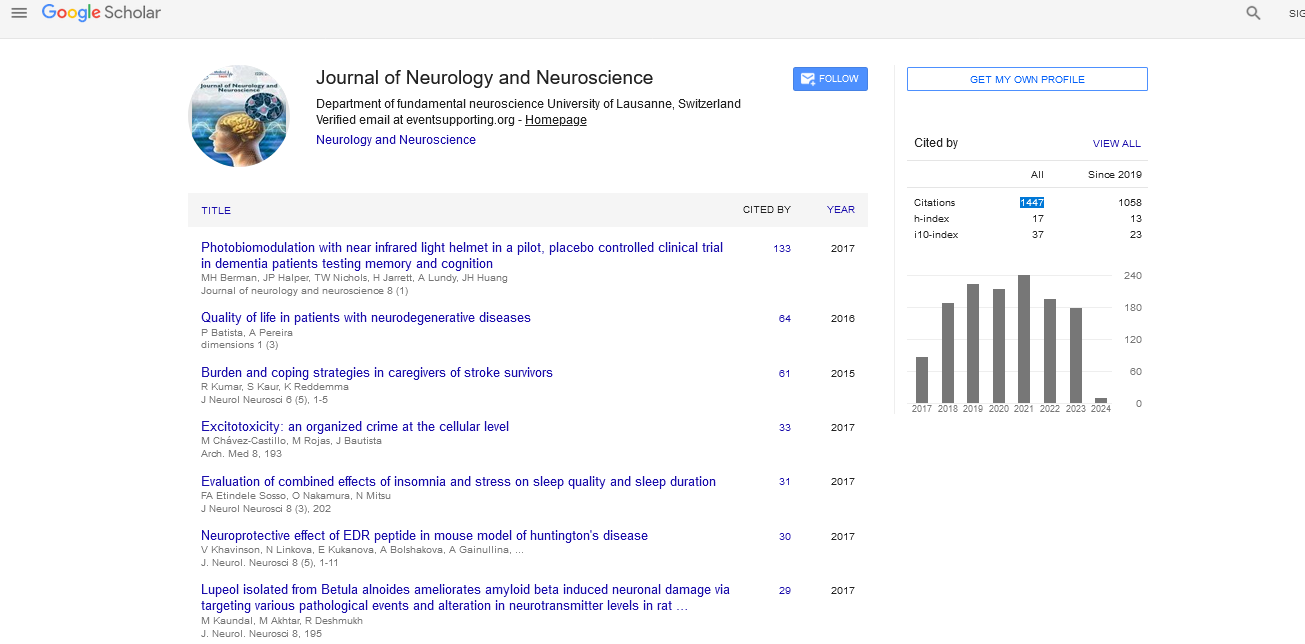Commentary - (2023) Volume 14, Issue 3
The impact of sleep on brain health: Mechanisms and implications for neurological disorders
Mark Anderson*
Department of Pharmacology, University of Oxford, Oxford OX1 3AZ, UK
*Correspondence:
Mark Anderson, Department of Pharmacology, University of Oxford, Oxford OX1 3AZ,
UK,
Email:
Received: 29-May-2023, Manuscript No. ipjnn-23-13913;
Editor assigned: 31-May-2023, Pre QC No. P-13913;
Reviewed: 14-Jun-2023, QC No. Q-13913;
Revised: 20-Jun-2023, Manuscript No. R-13913;
Published:
28-Jun-2023
Introduction
Sleep is a fundamental physiological process that
plays a critical role in brain health and overall well-being.
The impact of sleep on brain function and its potential
implications for neurological disorders have garnered
significant attention in recent years. This review explores
the mechanisms underlying the relationship between
sleep and brain health, as well as the implications for
neurological disorders. We discuss the importance of
sleep in brain homeostasis, synaptic plasticity, memory
consolidation, and cognitive function. Furthermore, we
delve into the potential consequences of sleep disturbances
on neurological disorders, including Alzheimer's disease,
Parkinson's disease, and stroke. Understanding the complex
interplay between sleep and brain health offers insights into
the development of preventive strategies and therapeutic
interventions for neurological disorders [1].
Description
Sleep is a dynamic process consisting of different stages
and cycles, each serving distinct functions. It is during
sleep that the brain undergoes critical restorative processes,
such as the clearance of metabolic waste products and
the consolidation of memories. Sleep plays a vital role in
maintaining brain homeostasis by allowing for the recovery
of energy reserves, the regulation of synaptic strength,
and the removal of toxic byproducts that accumulate
during wakefulness [2]. Synaptic plasticity, the ability
of synapses to modify their strength and connections, is
essential for learning and memory formation. Sleep has
been shown to support the consolidation of newly acquired
information, facilitating memory retention and enhancing
cognitive performance. During sleep, the brain undergoes
reactivation and reorganization of neuronal connections,
leading to the integration of new memories into existing
networks [3].
Disruptions in sleep patterns, such as sleep deprivation,
sleep fragmentation, or sleep disorders, can have
detrimental effects on brain health. Sleep disturbances
have been associated with an increased risk of developing
neurological disorders, including Alzheimer's disease,
Parkinson's disease, and stroke. Sleep disturbances may
contribute to the accumulation of amyloid-beta plaques
in Alzheimer's disease, exacerbate motor symptoms in
Parkinson's disease, and affect stroke recovery by impairing
neural repair mechanisms and promoting inflammation
[4].
The relationship between sleep and neurological
disorders is bidirectional. Neurological disorders
themselves can disrupt sleep architecture and quality,
further exacerbating symptoms and impairing overall
brain health. Sleep disturbances, when combined with
preexisting neurological conditions, can create a vicious
cycle, leading to a negative impact on both sleep quality
and disease progression [5].
Conclusion
Sleep is a fundamental process crucial for brain
health and optimal cognitive functioning. The intricate
relationship between sleep and brain function highlights
the importance of sleep in maintaining brain homeostasis,
synaptic plasticity, memory consolidation, and overall
cognitive performance. Disruptions in sleep patterns and
sleep disturbances have been associated with increased
vulnerability to neurological disorders, including
Alzheimer's disease, Parkinson's disease, and stroke.
Addressing sleep-related issues and promoting healthy
sleep habits may have implications for the prevention,
management, and treatment of these disorders.
Further research is needed to elucidate the underlying
mechanisms connecting sleep disturbances and neurological
disorders. Developing targeted interventions to improve
sleep quality and quantity, as well as exploring the
potential therapeutic benefits of enhancing sleep, may offer
novel strategies for preventing or mitigating the impact
of neurological disorders. Promoting awareness of the
critical role of sleep in brain health and incorporating sleep
assessments and interventions into clinical practice have
the potential to enhance patient outcomes and improve
overall brain health. Ultimately, a comprehensive approach
that recognizes and addresses the impact of sleep on
neurological disorders can contribute to the development
of personalized strategies for promoting brain health and
improving the quality of life for individuals affected by
these conditions.
Acknowledgement
None.
Conflict of Interest
None.
References
- Bruce ML, Ten Have TR, Reynolds III CF, et al. Reducing suicidal ideation and depressive symptoms in depressed older primary care patients: A randomized controlled trial. Jama. 2004;291(9):1081-1091.
Google Scholar, Crossref, Indexed at
- Husain SF, Tang TB, Yu R,et al. Cortical haemodynamic response measured by functional near infrared spectroscopy during a verbal fluency task in patients with major depression and borderline personality disorder. E Bio Med. 2020;51.
Google Scholar, Crossref, Indexed at
- Pinti P, Tachtsidis I, Hamilton A, et al. The present and future use of functional Near‐Infrared Spectroscopy (fNIRS) for cognitive neuroscience. Ann N Y Acad Sci. 2020;1464(1):5-29.
Google Scholar, Crossref, Indexed at
- Laudisio A, Antonelli Incalzi R, Gemma A, et al. Definition of a geriatric depression scale cutoff based upon quality of life: A population‐based study. Int J Geriatr Psychiatry. 2018;33(1):e58-64.
Google Scholar, Crossref, Indexed at
- Delpy DT, Cope M, Van der Zee P, et al. Estimation of optical pathlength through tissue from direct time of flight measurement. Phys Med Biol. 1988;33(12):1433.
Google Scholar, Crossref, Indexed at





